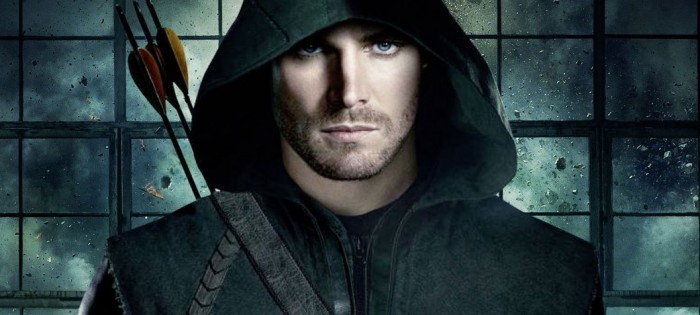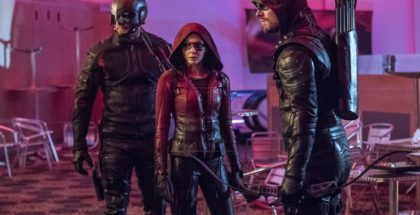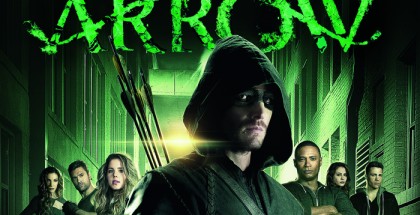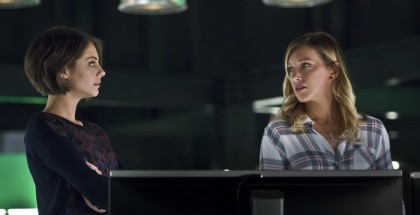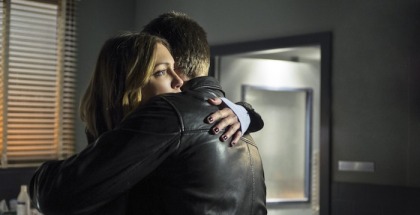Amazon Prime Instant TV review: Arrow (Season 1)
Review Overview
Superhero action
8Soap opera
7Season finale
9Matthew Turner | On 09, Sep 2014
With Arrow Season 1 available to watch online in the UK on Amazon Prime, we warm up for Season 3’s arrival in the UK by looking back at how The CW’s superhero series started.
“My name is Oliver Queen. For five years, I was stranded on an island with only one goal: survive. Now I will fulfil my father’s dying wish, to use the list of names he left me and to bring down those who are poisoning my city. To do this, I must become someone else. I must become something else.”
That’s the pre-episode set-up for Arrow, the superhero show from The CW (the network behind Smallville), which is about to enter its third season. Based on the DC comics character Green Arrow (essentially part Robinson Crusoe, part Robin Hood, part Batman), the show successfully combines exciting action, a strong comic book background, impressive plotting and a cast of compelling, complex characters. While its first season overall may have a few wobbles, it builds to a terrific climax and currently stands as one of the best comic book shows to hit the small screen. Crucially, as the course of Season 1 shows, Arrow is also willing to learn from its mistakes, becoming a much stronger programme in the process.
The pilot episode gets the audience up to speed very quickly, jumping from an island rescue sequence to a news segment that fills in the rest of the details (the series is set in Starling City, Oliver is the playboy son of billionaire Robert Queen, who died in the shipwreck that stranded him on the island), before getting on with setting up its key cast. Alongside Oliver (Stephen Amell), we have his mother, Moira (Susanna Thompson), his tearaway sister, Thea, nicknamed “Speedy” (Willa Holland), his best friend, Tommy Merlyn (Colin Donnell), Tommy’s wealthy and powerful father, Malcolm Merlyn (John Barrowman), Oliver’s ex-girlfriend, attorney Laurel Lance (Katie Cassidy), and Laurel’s Police Detective father, Quentin Lance (Paul Blackthorne).
Important characters introduced later in the series include Oliver’s bodyguard and confidant John Diggle (David Ramsey), who becomes his partner in crime-fighting, and wise-cracking IT genius Felicity Smoake (Emily Bett Rickards), who joins the team halfway through and quickly becomes the series’ MVP.
Structurally, each episode plays out more or less the same way: Oliver dons his costume (a functional-looking green leather ensemble, accessorised with a hood and an enormous amount of eye-shadow that doubles as a mask) and sets out to take down one of the people on his father’s list (usually one of the 1 per cent). After accusing them of having failed his city, he frequently offers them a chance to redeem themselves, but he isn’t above flat-out killing them either, of which more later.
Occasionally, a more superhero-like threat will present itself, with the show presenting slightly re-tooled versions of established DC supervillains, such as Deadshot (Michael Rowe), Firefly (Andrew Dunbar) and China White (Kelly Hu), as well as troubled figures, such as The Huntress (Jessica De Gouw). In addition, there will usually be one of the show’s soapier subplots to deal with, such as the emerging love triangle between Oliver, Laurel and Tommy (complicated by the fact that Oliver was cheating on Laurel with her sister, Sara, who was on board the boat when it went down and is presumed dead) or Thea going off the rails.
On top of that, Arrow uses a series of flashbacks to tell the story of what happened to Oliver on the island in those five years (a bit like Lost in reverse), with the, often informing or commenting on the present day action in some way. Recurring characters in these sequences include Australian secret service operative Slade Wilson (Manu Bennett), who saves Oliver’s life and teaches him some fighting skills, mysterious former Chinese general Yao Fei (Byron Mann), Yao Fei’s daughter, Shado (Celina Jade), who teaches Oliver archery and martial arts, and evil mercenary Edward Fyers (Sebastian Dunn), who bears an amusing resemblance to David Cameron.
Whereas Smallville (the show’s spiritual predecessor, even if the showrunners opted for a fresh start by not casting Smallville’s own Green Arrow, Justin Hartley) famously had a “no tights, no flights” rule, Arrow has so far shied away from depicting actual super powers, but has no problem at all with costumes, with both Deadshot and The Huntress bearing strong resemblance to their comic book counterparts.
Similarly, the show has demonstrated an enjoyable willingness to tantalise fans by playing interesting games with the DC Universe, particularly in terms of the names it has given to its supporting characters. For example, Speedy is Green Arrow’s most famous sidekick in the comics, Tommy Merlyn is an alias for one of his many enemies, and Laurel Lance is the alter-ego of Black Canary, a superheroine who eventually marries Green Arrow. The show also continually references both places and characters that are significant in the comics, even if it hasn’t yet got around to showing them.
However, alongside Arrow’s genuinely exciting action choreography, the show’s greatest strength lies in its thematic complexity, most notably in Ollie’s gradual transition from vengeance-fuelled outlaw (he is referred to as The Vigilante for much of the season) to tried-and-tested hero, complete with the left-leaning social conscience that distinguished his comic’s counterpart. In particular, the addition of Diggle and Felicity as sidekicks allows for some complex debate around the issue of whether Oliver should kill in pursuit of his goals, and the moral consequences of doing so. An especially clever aspect of this is that the island flashbacks show Ollie having to become ruthless and willing to kill in order to survive, while the present day sequences, on some level, show him having to relinquish that ruthlessness in order to become human again.
This isn’t to say that the series is entirely without flaws: for example, some of the acting is a little dodgy early on (although by the end of the season everyone seems to have found their feet), while the love triangle element fails due to an unfortunate lack of chemistry between any of its participants.
That said, Arrow has proven itself to be a show that is willing to learn from and address its mistakes, both in story-telling techniques – it ditches Oliver’s clumsy voiceover narration pretty early on – and general plotting, most notably with Oliver struggling to make peace with murder.
All in all, Arrow is a series that has evolved considerably over the course of its first season, overcoming difficulties and growing in confidence, to the point where it pulls off one of the best season finales in recent memory and leaves its audience excited for the prospect of Season 2 – and, eventually Season 3.
You can watch Arrow Season 1 online on Amazon Prime Video as part of a Prime membership or a £5.99 monthly subscription – or, if you would also like unlimited UK delivery, as part of a £79 annual Amazon Prime membership.
Want more Arrow? Find out where to watch Season 3 online in the UK from 30th October.


